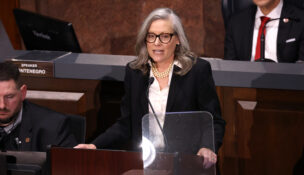Key Points:
Lawmaker says transgender Arizonans can’t amend their birth certificates
Their measure seeks to overturn judge’s ruling that surgery isn’t necessary to amend a birth certificate
State Republicans say birth certificates are historical records and should not be altered
State lawmakers gave final approval on April 28 to erase the possibility that transgender Arizonans can ever have their birth certificates amended, a move that one advocate said is tantamount to "genocide at its worst.''
On paper, the 32-27 party-line vote by the House for House Bill 2438 would repeal an existing provision in Arizona law that says those who have submitted to sexual reassignment surgery are entitled to ask the state health department for a new birth certificate, one that matches their gender.
But Rep. Rachel Keshel, R-Tucson, who crafted the measure acknowledged there's another agenda.
She noted that a federal judge in Tucson ruled last year that any transgender person can seek a similar amendment, regardless of whether they have undergone surgery. More to the point, Judge James Soto said that making reassignment surgery a prerequisite is discriminatory because not everyone who does not identify with the gender of their birth needs surgery to live their lives.
Keshel told colleagues that repealing the existing law undermines the reasoning behind Soto's ruling and overturns its conclusion. She said this move "protects the integrity of government-issued documents with true biological fact."
Only if there is evidence that an original birth certificate was "factually inaccurate at the time of recordation'' could a birth certificate be amended.
The measure has already been approved by the Senate and now goes to Gov. Katie Hobbs.
During committee debate on the measure, Aven Kelley, representing Planned Parenthood Advocates of Arizona, told lawmakers that denying the ability to amend a birth certificate has real implications. She said one reason people need and use birth certificates is to obtain other documents, such as getting a driver's license or registering for college.
"So if a person's gender identity doesn't match these documents, then they could be forcibly 'outed' when applying for these other forms of documents,” Kelly said. "And that could result in violations of their privacy.''
Paul Bixler presented a more personal view.
"I am a transgender woman,'' she told members of the House Judiciary Committee when the measure was debated there. "I exist, we exist.''
Bixler, who says she was the first transgender individual ever elected to a school board in Arizona, said she didn't choose to be transgendered.
"Nobody does,'' she said. And Bixler said she took offense at bills like this.
"The unnecessary, unceasing effort by the Arizona State Legislature to deny and eradicate our existence is genocide at its worst and bigotry at its best,'' she said. "Please stop this injustice.''
But Republican lawmakers disagree. Rep. Alexander Kolodin, R Scottsdale, said the birth certificate is simply a historical record that should not be altered.
"I was born on a certain day,'' said Kolodin. "I don't have a constitutional right to have a different birth date on my birth certificate.''
Rep. Khyl Powell, R-Gilbert, said the issue is even simpler to him. He said it's a matter of "natural law.''
"When we are born under the natural law of procreation, we are given either one or the other of the biological sex,'' Powell said, something he said is reflected in a birth certificate and should not be subject to alteration.
But Rep. Alma Hernandez, D-Tucson, lashed out at colleagues for repeated efforts targeting the transgender community. That includes not just this bill but others this session including whether teachers can call students by preferred pronouns and restrictions on who can use which bathrooms.
The Hernandez said Republicans seem interested in protecting individual freedom, but "only when it's convenient and fits your ideals.''
At the heart of the ruling Keshel seeks to overturn gender dysphoria, a condition where a person's gender identity does not match the sex assigned at birth, the one on an individual's birth certificate.
The original 1913 Arizona law spelled out that birth certificates document a baby's external genitalia at birth. That, however, was amended in 1967 to allow for amendments if the person underwent a surgical procedure or it was discovered that the chromosomal count differed from the sex marked on the certificate.
Attorney Rachel Berg from the National Center for Lesbian Rights filed suit in 2020 on behalf of three transgender boys whose Arizona birth certificates listed them as female and a transgender girl who identified as male.
In finding the law discriminatory last year, Soto said the statute presents transgender individuals who want an amended birth certificate with a choice: Undergo surgery which may not be medically necessary, or have to live with and present a birth certificate that does not reflect their gender. And that latter option, said the judge, forces those individuals to essentially "out'' themselves as transgender, something he said violates their rights.
"Not every transgender person needs surgery to complete a gender transition,'' he wrote. "Starting social transitioning and other recommended therapy may eliminate the need for any potential surgical intervention.''
Even if Arizona repeals all rights to an amended birth certificate, that, by itself, may not be enough to undermine Soto's ruling. He also said there are other constitutional issues like transgender individuals being the victims of unequal treatment.
"For non-transgender individuals — the vast majority of whom have an accurate birth certificate — they are not presented with the unlawful choice of being stripped of their bodily autonomy or face discrimination, harassment and potential violence,'' Soto wrote.

































